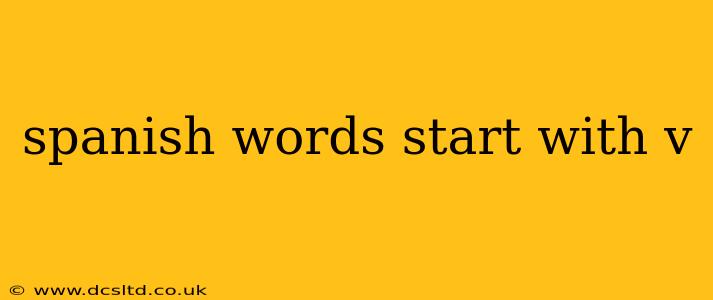Learning a new language can be a rewarding journey, and mastering vocabulary is a crucial step. This guide dives deep into the world of Spanish words beginning with the letter "V," exploring their meanings, usage, and providing examples to enhance your understanding. We'll cover common words, less frequent ones, and even explore some interesting linguistic nuances.
What are some common Spanish words that start with V?
This is a great starting point for anyone looking to expand their Spanish vocabulary. Many everyday words begin with "V," and understanding them is key to effective communication. Let's look at some of the most frequently used:
-
Ver (to see): This is arguably one of the most important verbs in Spanish. You'll use it constantly! Examples include: Yo veo la película (I see the movie), Ella ve el problema (She sees the problem).
-
Venir (to come): Another crucial verb, venir indicates arrival or approach. Examples include: Él viene mañana (He is coming tomorrow), ¿Cuándo vienen ustedes? (When are you coming?).
-
Vida (life): A fundamental noun referring to existence. Examples: La vida es bella (Life is beautiful), disfrutar la vida (enjoy life).
-
Valle (valley): This noun describes a low-lying area between hills or mountains. Example: Un valle verde (A green valley).
-
Veinte (twenty): A cardinal number essential for counting. Example: Veinte años (Twenty years).
-
Volar (to fly): This verb describes the action of flying in the air. Example: Los pájaros vuelan (The birds fly).
What are some less common Spanish words that start with V?
While the above words are frequently encountered, exploring less common vocabulary enriches your understanding of the language’s depth and versatility. Here are a few examples:
-
Vacío (empty): Describes something lacking content. Example: La botella está vacía (The bottle is empty).
-
Valiente (brave): An adjective describing courage. Example: Un soldado valiente (A brave soldier).
-
Variedad (variety): Refers to a range of different things. Example: Una variedad de colores (A variety of colors).
-
Vapor (steam/vapor): A noun referring to water in its gaseous state. Example: Vapor de agua (Water vapor).
-
Viento (wind): Describes the movement of air. Example: Un viento fuerte (A strong wind).
-
Violeta (violet): This word can refer to both the color and the flower. Example: Una flor violeta (A violet flower).
Are there any verbs starting with V that are irregular?
Yes, many verbs starting with "V" are irregular. This means they don't follow standard conjugation patterns. Understanding these irregularities is crucial for accurate grammar. Ver and venir, for example, are irregular verbs and require memorization of their conjugations. Consulting a comprehensive Spanish verb conjugation chart is recommended.
How can I learn more Spanish words starting with V?
The best way to expand your vocabulary is through consistent immersion and practice. Here are some helpful tips:
- Use flashcards: Create flashcards with words, their meanings, and example sentences.
- Read Spanish books and articles: Immerse yourself in the language by encountering words in context.
- Watch Spanish-language films and TV shows: This is a fun and engaging way to learn new words.
- Use language learning apps: Many apps offer vocabulary building exercises and games.
- Practice speaking with native speakers: This is the best way to improve your fluency and vocabulary.
By consistently practicing these methods, you will significantly enhance your Spanish language proficiency. Remember to focus not only on memorizing words but also on understanding their context and usage within sentences. Happy learning!
